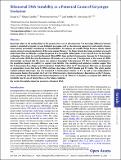| dc.contributor.author | Li, Duojia | |
| dc.contributor.author | Gandhi, Dhyey | |
| dc.contributor.author | Kumon, Tomohiro | |
| dc.contributor.author | Yamashita, Yukiko M | |
| dc.date.accessioned | 2023-01-10T16:31:38Z | |
| dc.date.available | 2023-01-10T16:31:38Z | |
| dc.date.issued | 2022-11-03 | |
| dc.identifier.uri | https://hdl.handle.net/1721.1/147035 | |
| dc.description.abstract | <jats:title>Abstract</jats:title>
<jats:p>Karyotype refers to the configuration of the genome into a set of chromosomes. The karyotype difference between species is expected to impede various biological processes, such as chromosome segregation and meiotic chromosome pairing, potentially contributing to incompatibility. Karyotypes can rapidly change between closely related species and even among populations of the same species. However, the forces driving karyotype evolution are poorly understood. Here we describe a unique karyotype of a Drosophila melanogaster strain isolated from the Seychelles archipelago. This strain has lost the ribosomal DNA (rDNA) locus on the X chromosome. Because the Y chromosome is the only other rDNA-bearing chromosome, all females carry at least one Y chromosome as the source of rDNA. Interestingly, we found that the strain also carries a truncated Y chromosome (YS) that is stably maintained in the population despite its inability to support male fertility. Our modeling and cytological analysis suggest that the Y chromosome has a larger negative impact on female fitness than the YS chromosome. Moreover, we generated an independent strain that lacks X rDNA and has a karyotype of XXY females and XY males. This strain quickly evolved multiple karyotypes: two new truncated Y chromosomes (similar to YS), as well as two independent X chromosome fusions that contain the Y-derived rDNA fragment, eliminating females’ dependence on the Y chromosome. Considering that Robertsonian fusions frequently occur at rDNA loci in humans, we propose that rDNA loci instability may be one of driving forces of karyotype evolution.</jats:p> | en_US |
| dc.language.iso | en | |
| dc.publisher | Oxford University Press (OUP) | en_US |
| dc.relation.isversionof | 10.1093/molbev/msac221 | en_US |
| dc.rights | Creative Commons Attribution 4.0 International license | en_US |
| dc.rights.uri | https://creativecommons.org/licenses/by/4.0/ | en_US |
| dc.source | Oxford University Press | en_US |
| dc.title | Ribosomal DNA Instability as a Potential Cause of Karyotype Evolution | en_US |
| dc.type | Article | en_US |
| dc.identifier.citation | Li, Duojia, Gandhi, Dhyey, Kumon, Tomohiro and Yamashita, Yukiko M. 2022. "Ribosomal DNA Instability as a Potential Cause of Karyotype Evolution." Molecular Biology and Evolution, 39 (11). | |
| dc.contributor.department | Massachusetts Institute of Technology. Department of Biology | en_US |
| dc.relation.journal | Molecular Biology and Evolution | en_US |
| dc.eprint.version | Final published version | en_US |
| dc.type.uri | http://purl.org/eprint/type/JournalArticle | en_US |
| eprint.status | http://purl.org/eprint/status/PeerReviewed | en_US |
| dc.date.updated | 2023-01-10T14:47:34Z | |
| dspace.orderedauthors | Li, D; Gandhi, D; Kumon, T; Yamashita, YM | en_US |
| dspace.date.submission | 2023-01-10T14:47:35Z | |
| mit.journal.volume | 39 | en_US |
| mit.journal.issue | 11 | en_US |
| mit.license | PUBLISHER_CC | |
| mit.metadata.status | Authority Work and Publication Information Needed | en_US |
